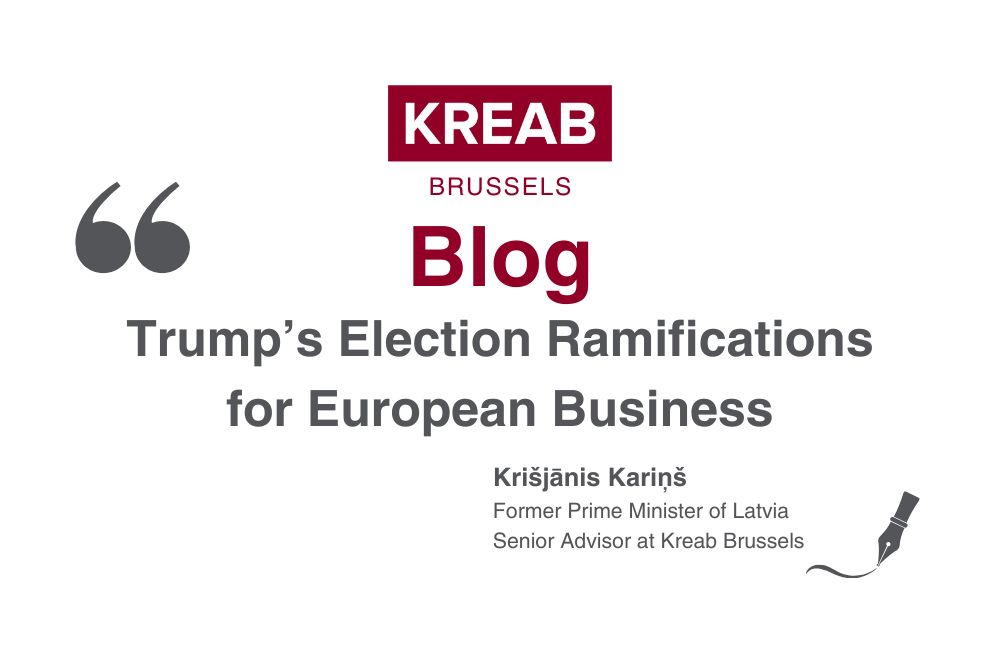
06/11/2024
Trump’s Election Ramifications for European Business
By Krišjānis Kariņš, former Prime Minister of Latvia, now Senior Advisor at KREAB Brussels)
The next US president will be Donald Trump. There are at least three big issues for European business that this will affect. (Here, I leave out the issue of the war in Ukraine.) I look at each in turn.
Economy
In his first term as president, Donald Trump introduced import tariffs on its trading partners China, Canada, Mexico, and the European Union (EU). This protectionist policy was continued in part by the Biden administration and has become “mainstream” American policy for the foreseeable future.
It is expected that such a policy will continue under the new Trump administration. The purpose of tariffs is primarily to protect US jobs and industry from what is perceived as “unfair” competition. This means that the US wants its partners to do some things differently, such as reduce subsidies or reduce restrictions on US imports.
This policy will in turn force the European Commission to react in kind. At best, this will lead to serious negotiations between the US and EU on how to better “balance” trade between the two markets. At worst, it could lead to a spiral of restrictive import tariffs on various goods, which in turn will drive up costs to business and consumers in Europe as well as the US.
Security
Europe’s security is underpinned by the NATO alliance, which was founded in 1949. NATO itself has been underpinned by the strength and readiness of the US military. Indeed, until recently only a handful of European NATO partners were investing the 2% of GDP into defence that all have pledged to do. The situation is now much improved, with almost 3/4 of all NATO partners (now 32 in total) investing the amount that was agreed upon. The Trump administration will continue to push for more European investment in defence, just as the Obama and Biden administrations did.
For the US, NATO is an extension of its military might, and there is no indication that a President Trump would be interested in diminishing the power of the US military. However, the US needs Europe to “pull its weight” regarding its own defence, so that the US can afford to allocate some of its resources to other theatres where they are needed, such as the Pacific.
From an economic point of view, the defence industry in Europe will have a high demand for weapons, ammunition, and military technology for the foreseeable future. The challenge will be for EU NATO members to agree politically to work more closely with one another to overcome challenges with interoperability, among other things.
China
The elephant in the room for the US is China, not Russia. As the US sees it, the rise of China both economically and militarily poses the greatest risk to their security. Trump will most likely continue to move the US more towards a “decoupling” of its economy from China and will most likely cajole its European partners to move from a policy of “de-risking” to decoupling as well.
While Europe was able to decouple rather easily from its massive dependence on Russian oil and gas supplies (due to alternative sources in the market), any further decoupling from China will cause stress. The reason is that European industry is tied quite closely to China, not only in supply chains, but also in export markets, such as for the German automotive industry. Given that different EU countries have different exposures to the Chinese market, the EU still does not have a coherent “China policy”. This divergence of immediate interests between the US and Europe will cause tensions both politically, and potentially also economically.
Summary
Trump’s victory is a clear sign that the US will continue to pursue an economic and political policy that will put its own interests first. For US voters, it boils down to jobs and opportunities. The administration will work to secure these, working with its partners where it can, but also at times moving against the wishes of its partners – even close partners such as the EU, if it perceives that its core interests are at stake.
_________________________________________________________________________________________
Krišjānis Kariņš, Senior Advisor at KREAB, was Prime Minister of Latvia from January 2019 to September 2023. He led his country through a banking crisis, the Covid pandemic, the hybrid migration attack from Belarus, and the first two years of Russia’s all-out war of aggression against Ukraine. After passing the torch of government leadership to a party colleague, he served as Foreign Minister until April of 2024. He reached the NATO defence spending target of 2% GDP with his first budget, and advanced purchases of air and coastal defence as well as rocket artillery, while overseeing the reinstitution of compulsory military service. His political career dates to 2002, when he co-founded the anti-corruption party (New Era) and was elected to Parliament. He then served as Minister of Economy 2004-2006. In 2009, he was elected to the European Parliament and served for 10 years.
